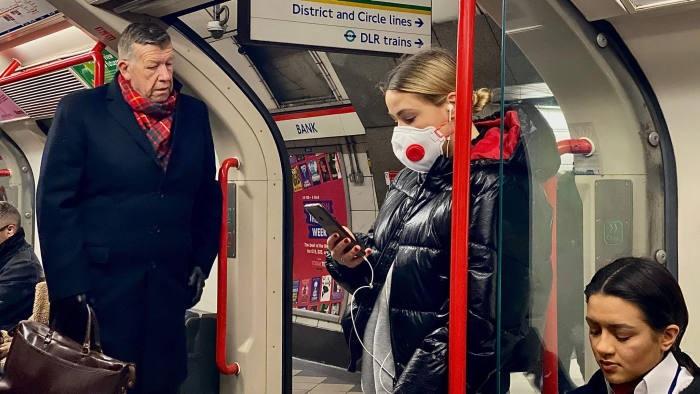A woman wears a face mask as she travels on London's Tube Photo:AFP/Getty
By Patryk Krych | The World Daily MARCH 14th 2020
Britain’s Coronavirus Inaction: Is it Dangerous?
With the announcement of the COVID-19 coronavirus having been labelled a pandemic, by the World Health Organisation (WHO) several countries have taken immediate if not entirely resolute action against the virus. All but Britain, which has come under heavy criticism for its handling of public facilities under the threat of the infection.
Various responses have been seen from different countries around Europe, in terms of reaction to the news of the COVID-19’s new threat level and infection rate. Thus far, the virus has claimed over 5,600 lives worldwide, and infected at least 150,000 people.
The Republic of Ireland responded to the immediate threat by announcing a shutting down of its schools and educational institutions for the following 2 weeks. Italy’s Prime Minister, in response to his country’s 21,000 reported cases of infection and over 1,400 deaths, had already announced a total shutdown of the majority of Italian institutions, from schools and operas to theatres and nightclubs, so on. Even American President Donald Trump recently declared and put into force a travel ban to and from 26 European nations in an attempt to quell the likelihood of viral travel.
In Britain, the advised actions to British citizens who are experiencing a high temperature and/or cough is to isolate themselves in-doors minimum for a week, or until it passes altogether. Little has been done otherwise, with institutions hardly seeing any of the other countries defensive arrangements come into place, and the majority of travel left unrestricted. Britain’s actions on the case of the COVID-19 virus -or lack thereof- has led to a lot of criticism thrown their way over the past few days.
At least 1,140 cases have been reported in the UK, along with 21 deaths thus far. Schools, concerts, sports events and other major gatherings where thousands of people may intermingle are still to go on ahead, according to the British Prime Minster Boris Johnson, out of concern that moving forward with such bans and public restrictions too soon could possibly lead to an overall rise in fears and public fatigue over the matter. Although, he did say the decisions to go through with the shutdowns is still undergoing consideration on their part.
The measures put into place by the British government, being far less stringent than their European neighbours, have been criticized with some severity by many scientists, public health figures, and medicinal experts, who insist that the virus, which they describe as the “worst public health crisis for a generation,” is not being treated with enough severity in the country.
Some scientists have warned and speculated that despite the reported figures available, it’s highly possibly that between 5,000 and 10,000 people have already been infected in Britain overall. “What you want to do is protect people in the most infectious period,” said the British government’s chief scientific adviser, Patrick Vallance, in defence of the UK governments decision. He clarified that what the British government wants to do is prevent the National Health Service from experiencing the effects of being overwhelmed with the crisis until its critical period, to “delay the peak and to push the peak down.”
It’s what the scientific and medical experts are referring to as something of a “staged” approach to the handling of the virus, where no harsh measures are taken until the number of infections see a “significant” rise, at which point they can be pushed back down. Though they assume this significant rise my not happen yet for a “few weeks.”
“Asking elderly people to stay at home - that is one thing that you really have to time... so that it coincides with the period at which the epidemic is at its peak,” Boris Johnson stated. “That is one of the reasons we are not triggering that draconian measure now.”
While the danger of the virus is acknowledged, they argue that shutting down schools and institutions now would mean their continued closure for the next 13-16 weeks, which wouldn’t be logical.
“We do need to do it at the last point it is reasonable so that people maintain their energy and enthusiasm to get through what will be quite difficult things to do,” said England’s Chief Medical Officer Chris Whitty.
By Patryk Krych | The World Daily






